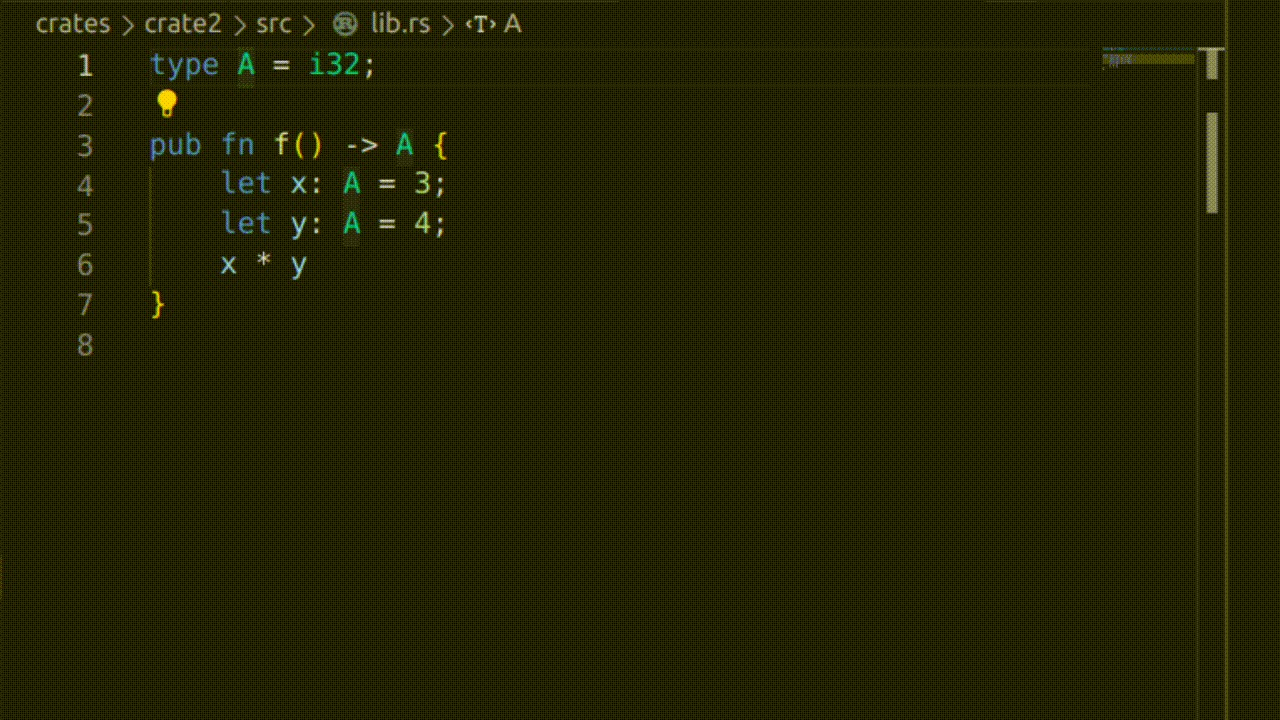feat: Add an assist for inlining all type alias uses
## Description
`inline_type_alias_uses` assist tries to inline all selected type alias occurrences.
### Currently
Type alias used in `PathType` position are inlined.
### Not supported
- Removing type alias declaration if all uses are inlined.
- Removing redundant imports after inlining all uses in the file.
- Type alias not in `PathType` position, such as:
- `A::new()`
- `let x = A {}`
- `let bits = A::BITS`
- etc.
## Demonstration

## Related Issues
Partially fixes#10881
feat: Run test mod from anywhere in parent file
The "Run" feature of rust-analyzer is super useful, especially for running
individual tests or test-modules during development.
One common pattern in rust development is to develop tests in the same file as
production code, inside a module (usually called `test` or `tests`) marked with
`#[cfg(test)]`. Unforunately, this pattern is not well supported by r-a today,
as a test module won't show up as a runnable unless the cursor is inside it.
In my experience, it is quite common to want to run the tests associated with
some production code immediately after editing it, not only after editing the
tests themselves. As such it would be better if test modules were available
from the "Run" menu even when the cursor is outside the test module.
This change updates the filtration logic for runnables in
`handlers::handle_runnables` to special case `RunnableKind::TestMod`, making
test modules available regardless of the cursor location. Other `RunnableKind`s
are unnaffected.
Fixes#9589
fix: resolve associated types of bare dyn types
Fixes#13031
We've been dropping the associated type bindings of trait object types that were written without the `dyn` keyword. This patch reuses the lowering logic for `TypeRef::DynTrait` so the associated type bindings are properly lowered.
The "Run" feature of rust-analyzer is super useful, especially for running
individual tests or test-modules during development.
One common pattern in rust development is to develop tests in the same file as
production code, inside a module (usually called `test` or `tests`) marked with
`#[cfg(test)]`. Unforunately, this pattern is not well supported by r-a today,
as a test module won't show up as a runnable unless the cursor is inside it.
In my experience, it is quite common to want to run the tests associated with
some production code immediately after editing it, not only after editing the
tests themselves. As such it would be better if test modules were available
from the "Run" menu even when the cursor is outside the test module.
This change updates the filtration logic for runnables in
`handlers::handle_runnables` to special case `RunnableKind::TestMod`, making
test modules available regardless of the cursor location. Other `RunnableKind`s
are unnaffected.
Fixes#9589
fix: a bunch of typos
This PR will fix some typos detected by [typos].
There are also some other typos in the function names, variable names, and file
names, which I leave as they are. I'm more certain that typos in comments
should be fixed.
[typos]: https://github.com/crate-ci/typos
This PR will fix some typos detected by [typos].
There are also some other typos in the function names, variable names, and file
names, which I leave as they are. I'm more certain that typos in comments
should be fixed.
[typos]: https://github.com/crate-ci/typos
fix: escape keywords used as names in earlier editions
Fixes#13030
There are keywords in Rust 2018+ that you can use as names without escaping when your crate is in Rust 2015 e.g. "try". We need to be consistent on how to keep track of the names regardless of how they are actually written in each crate. This patch attempts at it by taking such names into account and storing them uniformly in their escaped form.
This change improves the `generate_function` assist to support generating static methods/associated functions using the `Self::assoc()` syntax. Previously, one could generate a static method, but only when specifying the type name directly (like `Foo::assoc()`). After this change, `Self` is supported as well as the type name.
Fixes#13012
feat: Add a setting for keyword hover popups
This adds `rust-analyzer.hover.documentation.keywords.enable`, which defaults to `true` and can be turned off to disable the keyword documentation hover popups, which can be somewhat distracting when triggered by accident, and offer relatively little value if you're already familiar with the language.
Fixes https://github.com/rust-lang/rust-analyzer/issues/12950
This workaround avoids constant crashing of rust analyzer when using GATs with const generics,
even when the const generics are only on the `impl` block.
The workaround treats GATs as non-existing if either itself or the parent has const generics and
removes relevant panicking code-paths.
fix: Fix incorrect type mismatch with `cfg_if!` and other macros in expression position
Fixes https://github.com/rust-lang/rust-analyzer/issues/12940
This is a bit of a hack, ideally `MacroStmts` would not exist at all after HIR lowering, but that requires changing how the lowering code works.
Do not unconditionally succeed RUSTC_WRAPPER checks when run by build scripts
rust-analyzer's RUSTC_WRAPPER unconditionally succeeds `cargo check`
invocations tripping up build scripts using `cargo check` to probe for
successful compilations. To prevent this from happening the RUSTC_WRAPPER
now checks if it's run from a build script by looking for the
`CARGO_CFG_TARGET_ARCH` env var that cargo sets only when running build
scripts.
rust-analyzer's RUSTC_WRAPPER unconditionally succeeds `cargo check`
invocations tripping up build scripts using `cargo check` to probe for
successful compilations. To prevent this from happening the RUSTC_WRAPPER
now checks if it's run from a build script by looking for the
`CARGO_CFG_TARGET_ARCH` env var that cargo sets only when running build
scripts.